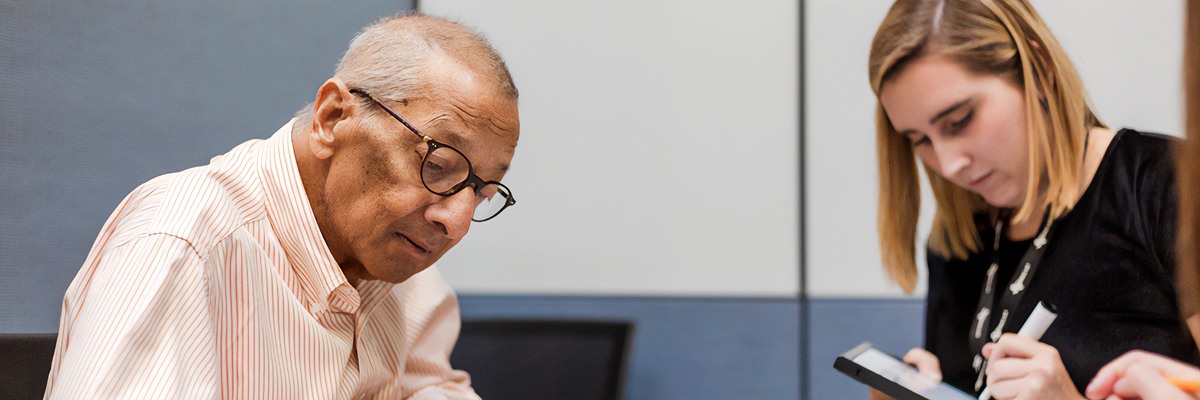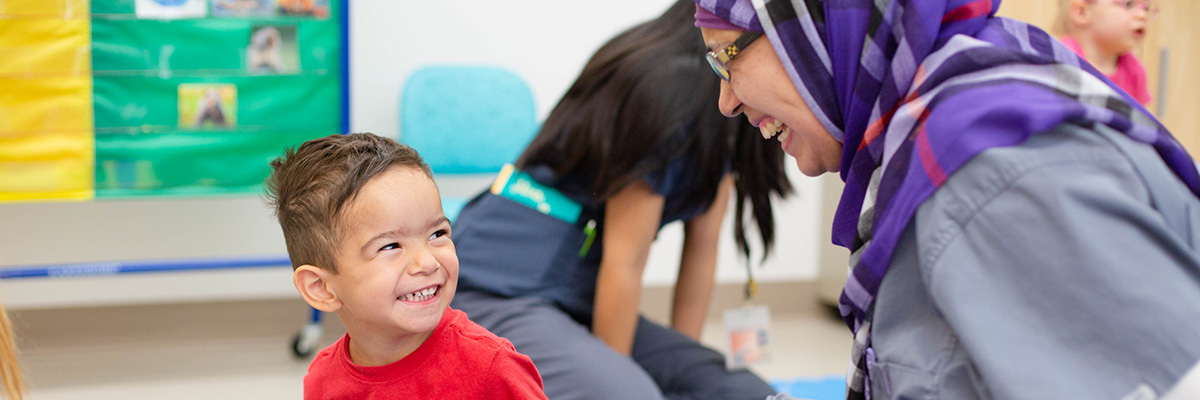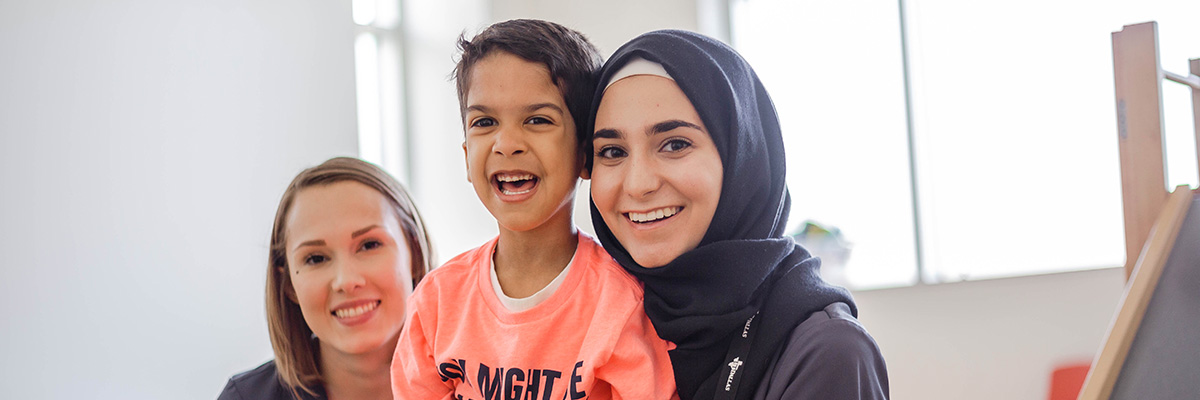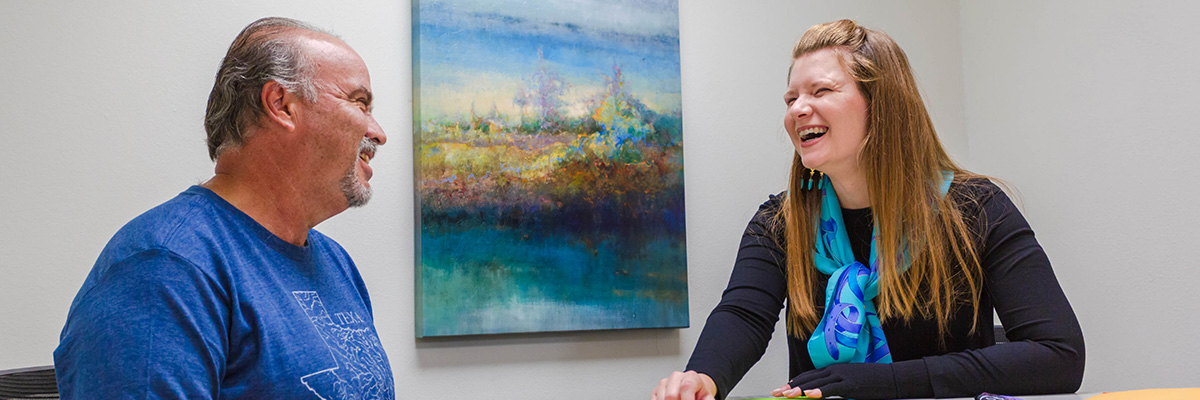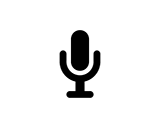Speech-Language Pathology MS
The Master of Science in Speech-Language Pathology degree provides unique academic and clinical training for students preparing for professional practice in speech-language pathology.
Virtual Open House
Meet our faculty and hear from students to learn more about what sets our graduate program apart!
Date: Friday, November 7, 2025
Time: 11:30 a.m. CST
See the open house flyer
Virtually on MS Teams
Meeting ID: 260 293 986 571 3
Passcode: kF6vu3oB
An RSVP is requested (but not required)
RSVP for the event.
The University of Texas at Dallas Master of Science (MS) in Speech-Language Pathology degree program provides unique academic and clinical training for students who are preparing for professional practice in speech-language pathology. The Master of Science program is housed at the UT Dallas Callier Center for Communication Disorders, known internationally for its programs of research and clinical service, and takes advantage of the wide array of clinical, medical, and educational facilities in the Dallas-Fort Worth area. Students have opportunities to participate in faculty research on topics that include child language development and disorders, autism spectrum disorders, bilingualism, literacy, speech production, and the neurobiology of language at the Callier Center as well as at three other UT Dallas centers: the Center for BrainHealth, the Center for Children and Families and the Center for Vital Longevity.
The program is ranked 18th among U.S. Master programs in speech-language pathology by U.S. News & World Report.
Admissions
Admission to the Speech-Language Pathology Master of Science program is based on a review of the applicant’s application portfolio, which includes:
- Grade point average (GPA)
- Scores on the Graduate Record Exam (GRE)
- Three letters of recommendation
- A “statement of purpose” essay describing the applicant’s specific interests and career goals
The Essential Functions and Technical Standards for Admission and Continued Enrollment describes necessary functions and skills for success in the program. Applicants are responsible for reviewing the technical standards for admission before applying to the SLP MS program.
| Semester of Admission | Application Deadline |
|---|---|
| Fall | February 15 |
| Spring | September 15 |
| Summer | February 15 |
See the UT Dallas graduate admissions page for general information on the application process. Specific questions about applying to the speech-language pathology Master of Science program should be directed to communicationdisorders@utdallas.edu.
Overview of MS SLP Curriculum
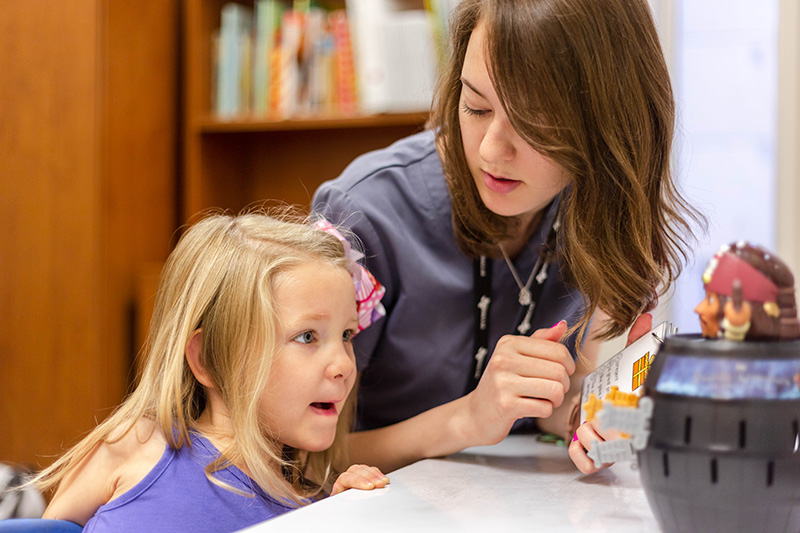
Students earning a Master of Science degree in Speech-Language Pathology enroll in coursework and clinical practicum/internship placements each term.
For students with undergraduate degrees in speech-language pathology, the Master of Science degree program requires five semesters of full-time study. Students entering the program from other fields typically need to complete prerequisite courses, in which case the program requires six semesters of full-time study.
Part-time study is not advised because most classes and practicum take place during the day. The program does not admit non-degree students.
Course of Study
Courses and clinical placements are designed around core requirements that are typically completed during the first three terms of the program, followed by electives that students choose from a broad array of specialties during the remaining terms as they develop their specific clinical interests and career goals. A highly customizable course of study is a hallmark of our program. Throughout their time at UT Dallas, students work closely with their academic advisor each semester in order to select the most appropriate courses for their goals and to maximize their graduate educational experience.
The UT Dallas graduate catalog provides more information on the Master of Science in Speech-Language Pathology degree. The university’s course database, CourseBook, describes specific courses in the program. Graduate courses in speech-language pathology are listed with the prefix COMD.
The Essential Functions and Technical Standards for Admission and Continued Enrollment describes necessary functions and skills for success in the program.
Clinical Experiences
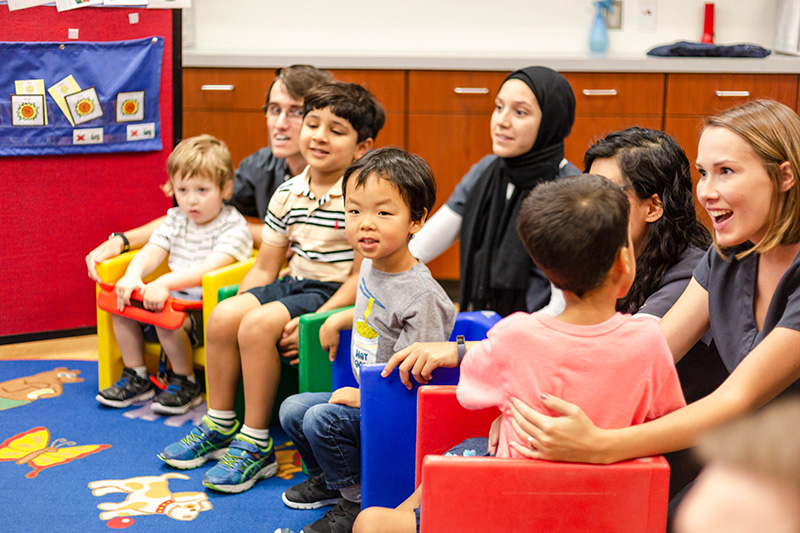
Overview of Clinical Experiences
Students earning a Master of Science degree in Speech-Language Pathology enroll in coursework and clinical practicum/internship placements each term. Between clinical partnerships with the many programs housed within the Callier Center for Communication Disorders and a wide variety of sites across the Dallas-Fort Worth Metroplex, our extensive connections and community resources provide students with experiences in a variety of settings and give them many options in the selection of on- and off-campus practicum and internship placements.
Within the first three semesters of study, students must complete one adult and one pediatric on-campus core practicum placement at either Callier Dallas or Callier Richardson. The Callier Center houses many programs across its Dallas and Richardson campuses for both children and adults; these programs are run by faculty and faculty associates who train and supervise graduate student clinicians.
The program maintains over 75 partnerships with off-campus practicum sites throughout the Dallas-Fort Worth Metroplex, including a wide variety of locations within each of the following areas: hospitals, private practices, home healthcare services, long-term care facilities, and both public and private schools.
Through our network of connections, students have the opportunity to work with clinicians who specialize in areas across the broad scope of practice of speech-language pathologists (SLPs). Students can choose to focus on either adult or pediatric populations, to specialize in a particular area of interest, or to select experiences across the lifespan and scope to attain a well-rounded background. All graduate students have a clinical advisor to guide them in their selection of practicum placements to ensure that they meet clinical competencies and are progressing toward their goals.
Students are required to complete an internship placement during one of their final two semesters.
Financial Aid
General information on financial aid for graduate students is available via the UT Dallas graduate admissions page. Financial aid for Master of Science students in the speech-language pathology program is limited and is awarded on a competitive basis after students have been admitted to the program. Please contact the program head for more information about funding opportunities for M.S. students in the speech-language pathology program.
UT Dallas Office of Financial Aid
UT Dallas Estimated Cost Calculator
Facilities
Callier Center for Communication Disorders
Research Opportunities
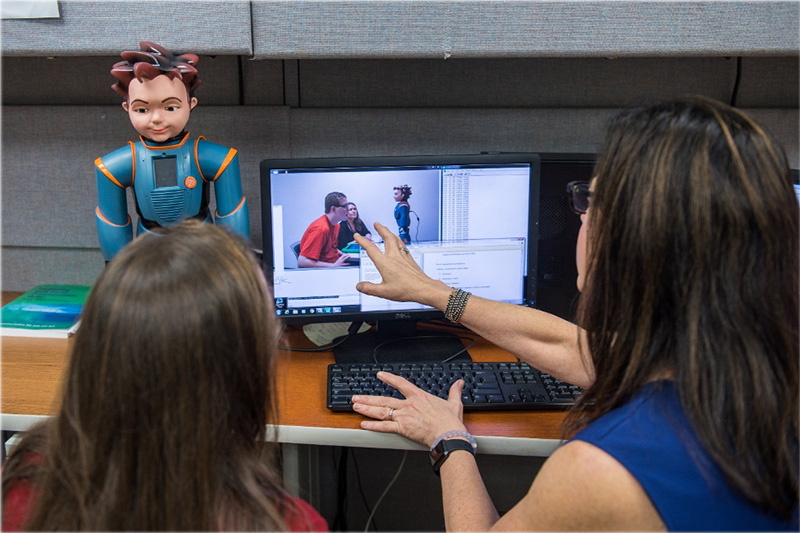
View Research Opportunities
Master of Science students are not required to be engaged in research. However, for those who are interested in taking part in research during their graduate career, a variety of laboratories provide either paid or unpaid positions. SLP students who help to design studies and collect data present posters at state and national meetings, publish papers, and may find that their research experience serves as a springboard to dual clinician-scientist training.
More information about researchers and laboratories can be found through the School of Behavioral and Brain Sciences.
Career Paths

View Career Paths
SLPs work to prevent, diagnose and treat communication disorders and swallowing disorders. They are employed in schools, hospitals and clinics; they often work collaboratively with other health care providers and educators. Job opportunities in speech-language pathology continue to expand with speech-language pathology consistently rated among the “100 Best Jobs” by U.S. News and World Report. In addition to clinical practice, SLPs also may be employed as researchers, educators, and administrators.
Through the broad selection of electives that allow our students to tailor their degree plan to their specific interests, graduates from our program enter the field well-prepared to follow their chosen career path. All graduates of the program are qualified for positions as a speech-language pathologist in clinical, educational, and medical settings.
For more information about career opportunities in speech-language pathology, please explore the website of the American Speech-Language-Hearing Association.
Student Experiences
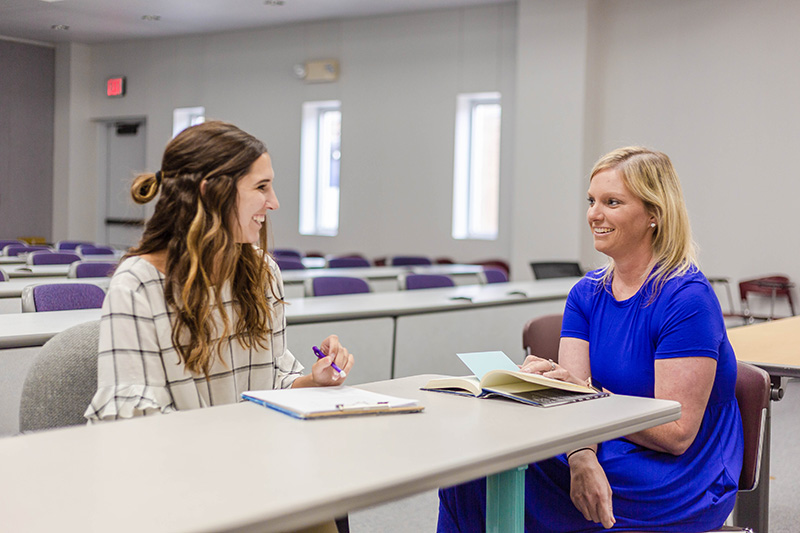
View Student Experiences
UTD’s top-tier SLP program is one of the largest programs in the country, and we have a correspondingly large faculty with expertise across the scope of practice, facilitating specializations across the scope of practice. In our SLP program, you will interact with different students in your elective courses and your practicum from semester to semester. We value and welcome excellent students from a wide variety of backgrounds, both in and out of field. This creates a strong program full of individuals with different perspectives, passions and personalities.
Our faculty and staff are dedicated advocates for our students, and guide and encourage them through their trajectory from incoming student to graduating colleague. In our program, we have a culture of collaboration and mutual success, and our faculty and staff’s office doors are typically open to welcome students and any questions they may have.
Student Testimonials (YouTube Videos)
Student Perspectives
What are Some Unique Things that Set UTD Apart as a Program?
My favorite part about UTD is the professors and supervisors. They go above and beyond what I would expect professors to do for classes and practicums and to support students. The faculty has an open-door policy, and it is evident in the way they interact with students. Shoot a professor an email and they answer right away, call your supervisor and they pick up; walk in their office and they do their best to help you. The faculty’s knowledge and accessibility really make the program unique for me! – Anna Spencer
I love how customizable the program is! Each semester, you get to pick various electives in areas you are interested in. For example, I am interested in working with the pediatric population, and so this past summer I took Pediatric TBI and loved it! I think the ability to customize your schedule really allows you to explore and gain knowledge in many of the areas that you may want to work with as a future SLP. – Rachel
What is a Typical Day Like?
Each semester will vary, but in an average week a practicum may be 9 to 11:30am two to four times a week, then classes in the afternoon starting at 1pm. You usually get out in the mid-afternoon each day– some days might be 2:30, others 5:00pm. After your first semester, you’re able to mold your class schedule a little more and may have a couple mornings a week with no practicum, or a big study break in between classes.
Student Organizations
View Student Organizations
Students can join the Texas Speech-Language Hearing Association (TSHA) as well as the national and local chapters of the National Student Speech Language Hearing Association (NSSLHA), the student correlate of the American Speech-Language-Hearing Association (ASHA). Each of these organizations provides opportunities for involvement, connection, resources, and networking among students and future colleagues.
Alumni Experiences
View Alumni Experiences
We have a wide network of successful alumni both within the Dallas-Fort Worth Metroplex and across the United States. Our program values our alumni and their input, and we love to maintain contact with former students. We regularly send communications related to the field of speech-language pathology to our alumni, including job openings in Texas and around the country. Our graduates are highly sought, and we routinely hear from recruiters seeking to hire UTD graduates.
Student Alumni Experiences (YouTube Videos)
Life in Dallas-Ft. Worth
View Life in Dallas-Ft. Worth
Most SLP courses take place at Callier Dallas near UT Southwestern in the Medical District, while some electives and prerequisites are housed on UT Dallas’s main campus in Richardson. Core practicum sites are located at both Callier Dallas and Callier Richardson. Students often live near or between Callier Dallas and UT Dallas’ main campus, but some live all over the Metroplex.
While the program itself provides a community of connections with fellow students, the location offers all the conveniences, attractions, and resources of a large city. The Dallas-Fort Worth Metroplex is the fourth largest metropolitan area in the country, and as such, there is plenty to see and do.
While public transportation is available, it is limited, and SLP students generally find a car to be extremely helpful, if not necessary, for life in Dallas. Students regularly commute to classes and to off-campus practicum sites, which are spread throughout the city and sometimes across the Metroplex.
Program Accreditation and Outcome Data
The Master of Science (MS) education program in Speech-Language Pathology (residential) at The University of Texas at Dallas is accredited by the Council on Academic Accreditation in Audiology and Speech-Language Pathology of the American Speech-Language-Hearing Association, 2200 Research Boulevard #310, Rockville, MD 20850, 800-498-2071 or 301-296-5700.
Student Outcome Data
On-Time Completion Rates
| Year | # Completed within Expected Time Frame | % Completed within Expected Time Frame |
|---|---|---|
| 2024-2025 | 99 | 99% |
| 2023-2024 | 108 | 100% |
| 2022-2023 | 112 | 98% |
Praxis Examination Pass Rates of Test-Takers
| Year | # Taking the Exam | # Passed Exam | % Passed Exam Rate |
|---|---|---|---|
| 2024-2025 | 87 | 82 | 94% |
| 2023-2024 | 91 | 89 | 98% |
| 2022-2023 | 75 | 73 | 97% |
Speech-Language Pathology Strategic Plan
View the Speech-Language Pathology Strategic Plan
Program Contacts
Program Head
Michelle Aldridge, PhD, CCC-SLP
Office: CD A107
Phone: 972-883-3192
michelle.aldridge@utdallas.edu
Director of Clinical Programs
Jessica Carter, MS, CCC-SLP
Office: CD A105
Phone: 972-883-3013
jessica.carter@utdallas.edu
Program Coordinator
Chona Lucas
Office: CD B112
Phone: 972-883-3060
chona.lucas@utdallas.edu
Program Mailing Address
Master of Science in Speech-Language Pathology (MS SLP) Program
Department of Speech, Language, and Hearing
School of Behavioral and Brain Sciences
The University of Texas at Dallas
UT Dallas/Callier Center
1966 Inwood Road
Dallas, Texas 75235
Phone: 972-883-3060
communicationdisorders@utdallas.edu
Frequently Asked Questions (FAQ)
Can I Visit the Program?
The program welcomes visitors before or after admission, but we request that you apply prior to scheduling a visit.
Please note that the primary location for the Master of Science program is the UTD Callier Center – Dallas, which is near the UT Southwestern Medical Center District and downtown Dallas; it is NOT located at the main UT Dallas campus in Richardson.
We do not have a specified visitor’s day, but we set aside time each week for visitors. If you visit in the morning, you may be able to observe some of the student practicum programs. Call 972-883-3060 or email the program office to schedule a visit and for directions to Callier Dallas, which is located at 1966 Inwood Road, Dallas, Texas 75235. Note that parking and the building entrance are accessed from our driveway off Southwestern Medical Avenue. Callier Dallas is closed on weekends.
How Big is the Master of Science Degree Program?
The UT Dallas Master of Science degree program in speech-language pathology has more full-time students than any other SLP program in the U.S. During some semesters, there may be as many as 225 students enrolled in the program. There are many advantages to our size. Because of our program size, we offer more elective courses than most SLP programs. We offer 10-12 elective courses from which to choose each semester, and half of the courses in the degree plan will be electives. This allows students to develop their own areas of focus, taking courses across a broad range or shifting directions as their interests and career goals change (as they almost always do). Every student has an academic and clinical advisor and we ensure all students have access to faculty. We encourage you to talk with our current students and graduates about their experiences.
How are Admissions Decisions Made?
Admissions are made after reviewing an applicant’s portfolio with a holistic review process. The portfolio contains GRE scores, undergraduate GPA, three letters of recommendation, a narrative statement/essay, and a resume.
What are the Requirements for Students Coming From Out-of-field?
We welcome students whose undergraduate degrees are in fields other than speech-language pathology. Inclusion of students from a variety of fields enriches the educational experience for everyone. As a result, we make every effort to limit the number of prerequisite courses to those which cover material not taught at the graduate level. Students from out-of-field undergraduate majors apply directly to the Master of Science degree program; we do not offer a separate “leveling” or “post-baccalaureate” program. Out-of-field students who are admitted to the SLP MS program have specific prerequisite courses assigned as part of their overall degree plan, which adds one semester to the program duration. Out-of-field students may alternatively choose to take prerequisite courses at other institutions before applying to the UT Dallas Master of Science degree program. All students must complete four basic science courses as required by ASHA. For more information regarding prerequisites, contact the program office.
Does the Master of Science Program Provide Scholarships or Financial Aid?
All students can apply for need-based financial assistance – including loans, grants and work-study positions – through the University’s Office of Financial Aid. Students are strongly encouraged to request work-study funds as part of their financial aid package; there are many opportunities for employment within the department, including research-oriented positions and administrative positions that expose you to clinical program management and advanced classroom content. Competitive Callier Center scholarships are also available which, when awarded to non-resident students, make them eligible to pay resident tuition. There is no separate application required for the competitively awarded Callier Center scholarships; all admitted students are considered for these scholarships regardless of residency status. Other paid positions are periodically available through faculty research grants and as needed to assist in practicum and other program activities.
What are the Outcomes for Your SLP Graduates?
Program graduates enjoy excellent outcomes including high program completion, Praxis examination scores, and rates of employment.
What if I’m Also Interested in Doctoral Study?
Students with exceptional academic records who have career goals in university teaching and research may apply for admission to both the Master of Science degree program in Speech-Language Pathology and the PhD program in Speech, Language, and Hearing Sciences. The PhD is a research-intensive degree, not an advanced clinical degree, and completing the PhD will generally require an additional 3-4 years of study beyond the Master of Science degree. Students pursuing both degrees may have the opportunity to complete their clinical fellowship year at the Callier Center while enrolled in the doctoral program; however, a leave of absence from the PhD program is necessary if you are engaged in full-time clinical activities that preclude progress towards PhD program milestones.
In general, we recommend that students who are interested in both the MS and PhD programs apply first to the MS program. During the first year of master-level study, students can meet with faculty and doctoral students and participate in faculty research to identify an area of research focus and a potential doctoral mentor. At the start of the second year, if the student has a very strong academic record and a faculty member has agreed to become their PhD advisor, the student can apply to the PhD program.
We do not recommend combining a Master of Science degree in speech-language pathology with a Doctor of Audiology (AuD) degree. The AuD requires four years of full-time study and because there is little overlap in coursework or clinical experiences between the two degrees, completing both would require six years of study as well as an additional clinical fellowship year in speech-language pathology. AuD faculty offer MS courses in hearing loss and aural rehabilitation and MS students will find ample opportunity for related coursework, research, and clinical experience at the Callier Center. Each summer, the Callier Center hosts a camp for children who have cochlear implants and their families and a community-based program for adults with hearing loss. Speech-Language Pathology MS students and Audiology students earning the AuD are active participants in those programs.
Where Should I Live?
Most graduate courses are held at Callier Dallas. Some practicum experiences and a few elective courses are offered at Callier Richardson, but graduate students are at Callier Dallas most of the time. MS students should plan accordingly when deciding on a place to live. Public transportation is often limited but commuting by car is relatively easy and many students live in other areas of the city or Metroplex. Some student housing is available on the main campus in Richardson, but on-campus housing caters primarily to undergraduates. Please contact communicationdisorders@utdallas.edu for a list of apartment complexes within reasonable proximity to Callier Dallas. Online search engines can be used to filter potential apartment complexes that fit a specific price range and target location. As part of the welcome process for incoming students, the office of the Director of Clinical Education will provide students with the opportunity to send in a roommate request, which will be forwarded to other students seeking roommates.
